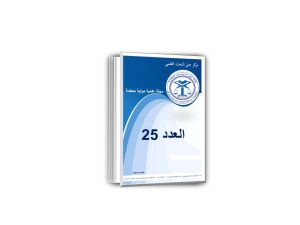
Digital editing and electronic publishing
“A legal vision in light of the ethical and regulatory challenges”
التحرير الرقمي والنشر الإلكتروني: “رؤية قانونية في ضوء التحديات الأخلاقية والتنظيمية“
Fadi Shoshan (PhD Student, Sakarya University, Turkey
فادي شوشان (طالب دكتوراه، جامعة ساكاريا، تركيا)
مقال منشور في مجلة جيل الدراسات المقارنة العدد 23 الصفحة 109.
مستخلص:
تتناول هذه الدراسة دور الفقه الإسلامي في تنظيم النشر الإلكتروني والتحرير الرقمي، مع التركيز على المبادئ الأخلاقية التي ينبغي أن تحكم هذه الممارسات. وتناقش التحديات المتعلقة بالتعددية واحترام الاختلاف في النشر الإلكتروني من منظور فقهي إسلامي. بالإضافة إلى ذلك، تدرس تأثير الوازع الديني في توجيه سلوكيات الأفراد داخل المجتمع الرقمي. كما تتناول قضايا النشر المضلل وتشويه المحتوى في الفضاء الرقمي، وتقدم رؤى حول كيفية التعامل مع هذه التحديات بما يتوافق مع القيم الإسلامية.
في هذا السياق، تؤكد الدراسة على ضرورة إيجاد توازن بين حرية التعبير والمسؤولية في النشر الإلكتروني. وتقدم الدراسة مجموعة من التوصيات التي تهدف إلى رفع الوعي الأخلاقي داخل المجتمع الرقمي، وتطوير قوانين وسياسات تتوافق مع مبادئ الفقه الإسلامي في هذا المجال.
ويستند هذا البحث إلى تحليل الأدلة الشرعية والمفاهيم الفقهية المتعلقة بالنشر الإلكتروني، ويسلط الضوء على أساليب الحفاظ على القيم الأخلاقية في بيئة رقمية دائمة التطور. وتختتم الدراسة بنتائج وتوصيات ذات صلة.
الكلمات المفتاحية: الفقه الإسلامي، النشر الإلكتروني، التحرير الرقمي، الأخلاقيات، النشر المضلل، تحريف المحتوى، حرية التعبير، المسؤولية، الانضباط الديني.
ABSTRACT:
This study examines the role of Islamic jurisprudence in regulating electronic publishing and digital editing, with a focus on the ethical principles that should govern these practices. It discusses the challenges related to pluralism and respect for different opinions in electronic publishing from an Islamic jurisprudential perspective. In addition, it examines the influence of religious self-discipline in guiding individuals’ behaviors within the digital society. The research also addresses issues of misleading dissemination and distortion of content
in the digital space and provides insights on how to deal with these challenges in accordance with Islamic values. In this context, the research emphasizes the necessity of finding a balance between freedom of expression and responsibility in electronic publishing. The study presents a set of recommendations that aim to raise ethical awareness within the digital community and develop laws and policies that are compatible with the principles of Islamic jurisprudence in this field.
This research is based on the analysis of Sharia evidence and jurisprudential concepts related to electronic publishing, and highlights methods for preserving moral values in an ever-evolving digital environment. The study concludes with relevant findings and recommendations.
Keywords: Islamic jurisprudence, electronic publishing, digital editing, ethics, misleading publishing, distortion of content, freedom of expression, responsibility, religious self-discipline.

